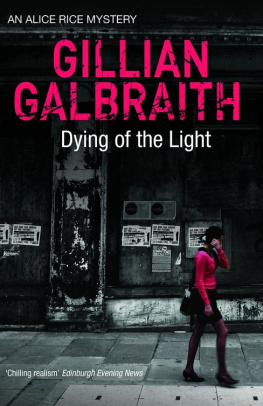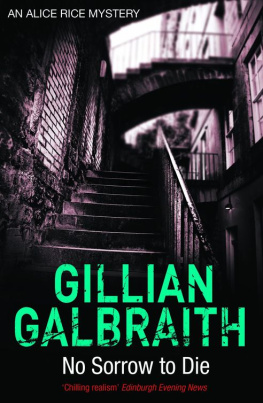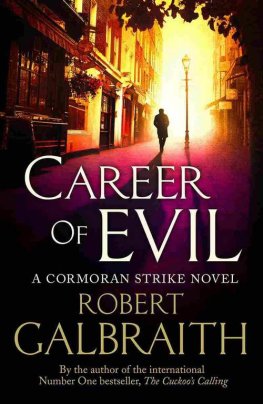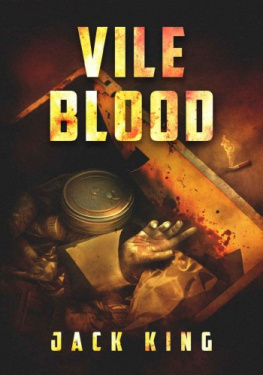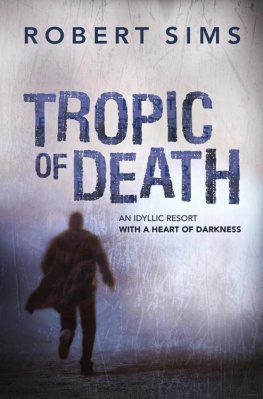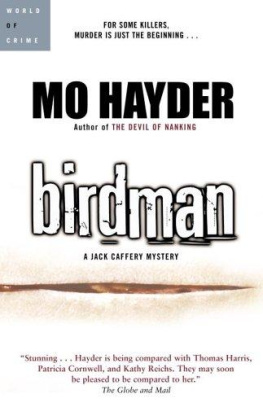Gillian Galbraith - Blood In The Water
Here you can read online Gillian Galbraith - Blood In The Water full text of the book (entire story) in english for free. Download pdf and epub, get meaning, cover and reviews about this ebook. genre: Detective and thriller. Description of the work, (preface) as well as reviews are available. Best literature library LitArk.com created for fans of good reading and offers a wide selection of genres:
Romance novel
Science fiction
Adventure
Detective
Science
History
Home and family
Prose
Art
Politics
Computer
Non-fiction
Religion
Business
Children
Humor
Choose a favorite category and find really read worthwhile books. Enjoy immersion in the world of imagination, feel the emotions of the characters or learn something new for yourself, make an fascinating discovery.

- Book:Blood In The Water
- Author:
- Genre:
- Rating:4 / 5
- Favourites:Add to favourites
- Your mark:
- 80
- 1
- 2
- 3
- 4
- 5
Blood In The Water: summary, description and annotation
We offer to read an annotation, description, summary or preface (depends on what the author of the book "Blood In The Water" wrote himself). If you haven't found the necessary information about the book — write in the comments, we will try to find it.
Blood In The Water — read online for free the complete book (whole text) full work
Below is the text of the book, divided by pages. System saving the place of the last page read, allows you to conveniently read the book "Blood In The Water" online for free, without having to search again every time where you left off. Put a bookmark, and you can go to the page where you finished reading at any time.
Font size:
Interval:
Bookmark:

Gillian Galbraith
Blood In The Water
The first book in the Alice Rice Mystery series, 2007
ACKNOWLEDGEMENTS
With grateful thanks for all their help to: David Bowen, Douglas Edington, Lesmoir Edington, Diana Griffiths, Jinty Kerr, Dr Elizabeth Lim, Aidan ONeill and Alisdair White. Any errors in the text are my own.
To Ma, with all my love
1
Thursday 1st December
Look, you can see it on the screen. Thats the baby there. Its now about, say, two inches from crown to rump and weighs, maybe, a quarter of an ounce you can see the little heart beating and everything that should be there seems to be there
Dr Clarke slid the transducer over her patients pregnant belly, keeping a careful eye at all times on the black and white image on the ultrasound screen. Mrs Greig smiled and grasped her husbands hand more tightly. He craned over her towards the screen, attempting to make out, amongst all the shades of grey, any recognisable human form.
Can you tell the sex yet? he asked.
No. The sex organs only begin to differentiate in the third month, and even then assessing gender can be difficult. Well do a more detailed scan later on in the pregnancy and we should get a better idea at that stage. Otherwise, if you are having amniocentesis the fluid can be checked and a more certain result given. What are you hoping for?
A girl, Mr Greig said firmly.
A healthy child, girl or boy, his wife corrected.
Well, Ill see you in about six weeks time when well take blood for the AFP estimation. In the meanwhile, youll be under the care of your GP, but dont hesitate to contact the hospital if you have any problems.
As Dr Clarke left the ultrasound room her patient was getting dressed. The white-coated consultant walked slowly towards her office, wondering why she felt tired so early in the day. She glanced at her watch registering that she had twenty minutes before she was scheduled to start her twelve oclock Monday appointment in the High Risk Maternity Clinic. Sufficient time for a cup of coffee and a skim of the newspaper. The office that had been allocated to her for the morning was small and uncomfortable. One entire wall was occupied by textbooks and periodicals, and a desk-top computer with all the paraphernalia associated with it seemed to have taken over the rest of the room. The sole window was obscured by a large leafy pot plant, a legacy from the previous occupant, which despite getting the lions share of any available light was in the process of dying untidily. The much reviled architecture of the new Royal Infirmary at Little France came out well in comparison with this, at least, and her own bolt-hole in the new hospital now seemed palatial in comparison to these dingy quarters. Clearing a stack of charts from the seat of the only chair available, she sat down and took a sip of her black brew.
Elizabeth Clarke was a tall woman, elegant in an understated way, with greying brown hair and pale blue eyes which communicated little emotion and surveyed the world with a distant, unblinking gaze. Her permanent expression of slight disdain and regal carriage gave her a patrician air, powerful enough to ward off all but the most confident. She wore almost no make-up, the slightest brush of mascara, but had begun to wonder whether she could still afford so little assistance with her appearance. As she began to daydream her mind drifted, once more, to her life and the absence of any man in it. They only complicate things, she thought, better no man than the wrong one, experience had taught her that much. But no sooner had she reassured herself than the voice of doubt whispered in her ear that she was too critical, unnaturally choosy, incapable of looking at any man other than as a potential spouse, and that she must change, learn to live in the moment and let things take their natural course, stop analysing every relationship to death and expecting perfection. She should settle for an ordinary, flawed mortal like everyone else. Her meditation was ended by the harsh tones of her beeper signalling the arrival of her first patient in the High Risk Clinic. Downing the dregs of her coffee, she rose to her feet and began to pick up the pile of medical records on her desk.
Eleanor Hutton was well-known to Dr Clarke. A patient who, more often than not, was the author of her many misfortunes and considered all advice given to her as optional. This was her fifth pregnancy, another mistake, and each new gestation had been more difficult to supervise than the last. The woman was a law unto herself. In between babies she turned up, erratically, at the Diabetes Clinic, usually when her condition was completely out of control. For a few weeks she would take note of whatever strictures had been directed at her, only to relapse into her careless ways until the next time. She was fat, jolly and untidy, invariably clad in tight clothes usually revealing, in unexpected places, rolls of white flesh. Dr Clarke, against her better judgement, liked her patient.
But I ken whit Im daein backwards, doctor Eleanor protested.
Yes, Eleanor, but you must turn up for your appointments, all your appointments. Youve missed the last three. Weve no recent record of your weight, the babys size, whether it has been moving as it should, the foetal heart rate. Theres been no booking scan, youre unsure about your last menstrual period, we havent been able to test your urine Where do I begin?
Ehm ma diabeetis is under control, the patient volunteered, to placate her physician.
Maybe. As you dont do half your blood-sugar tests Im not convinced youd know. Ive told you before you are exposing your baby to a real risk. If this is another big one-and Debbie was over eleven pounds, wasnt she?-it might die in the womb. These big babies sometimes do, often shortly before theyre due to be delivered. So we need to monitor their health, their size, particularly carefully And you smoked all during your last pregnancy. Dr Clarke was unable to suppress a sigh of exasperation.
Yell see, doctor, Ill attend frae noo on. You jist tell me when tae turn up and Ill be there. Ive gien up the fags this time, gied them up as soon as I kent I wis expecting. Eleanor smiled broadly, exposing denture-free gums, evidently considering, as usual, that her assurances of past and future compliance would be taken at face value.
If you have difficulty getting to the hospital I can, if necessary, arrange for you to be picked up by an ambulance for your appointment, Dr Clarke persisted.
Ill be there doctor, dinnae worry yerself again.
Dr Clarke left the clinic musing over the unfairness of human reproduction. Patients like Eleanor Hutton conceived as soon as blink, were careless of the health of their unborn children and yet usually carried to term. Others tried and tried, mangling their sex lives in the process, resorting to every quack device on the market only to conceive and then lose the child despite their meticulous care.
Collecting her coat and a battered leather case bulging with papers from her office, she left Lauriston Place and the old Royal Infirmary buildings and set off in the direction of South Bridge. When she got to Blackwells bookshop, she stopped to browse amongst the CDs in the music department and eat a hurried sandwich. On emerging onto the wet street, she congratulated herself on making only one purchase, Elgars Sea Pictures with Janet Baker. Temptation was usually succumbed to more fully; you could not have too many CDs. Crossing the road, she noticed, at a bus stop on the other side, Eleanor Hutton standing sheltering from the persistent drizzle. The pregnant woman was smoking a cigarette. The doctor was aware of a further temptation, the temptation to snatch the fag from the womans mouth and stamp it out on the wet pavement in front of her. Instead, hoping to embarrass her patient into some minimum of care for her unborn child, she simply gave a nod of recognition, watching intently as Mrs Hutton, on meeting her eyes, surreptitiously dropped her cigarette to the ground and extinguished the lipstick-stained stub with the heel of her boot.
Next pageFont size:
Interval:
Bookmark:
Similar books «Blood In The Water»
Look at similar books to Blood In The Water. We have selected literature similar in name and meaning in the hope of providing readers with more options to find new, interesting, not yet read works.
Discussion, reviews of the book Blood In The Water and just readers' own opinions. Leave your comments, write what you think about the work, its meaning or the main characters. Specify what exactly you liked and what you didn't like, and why you think so.

